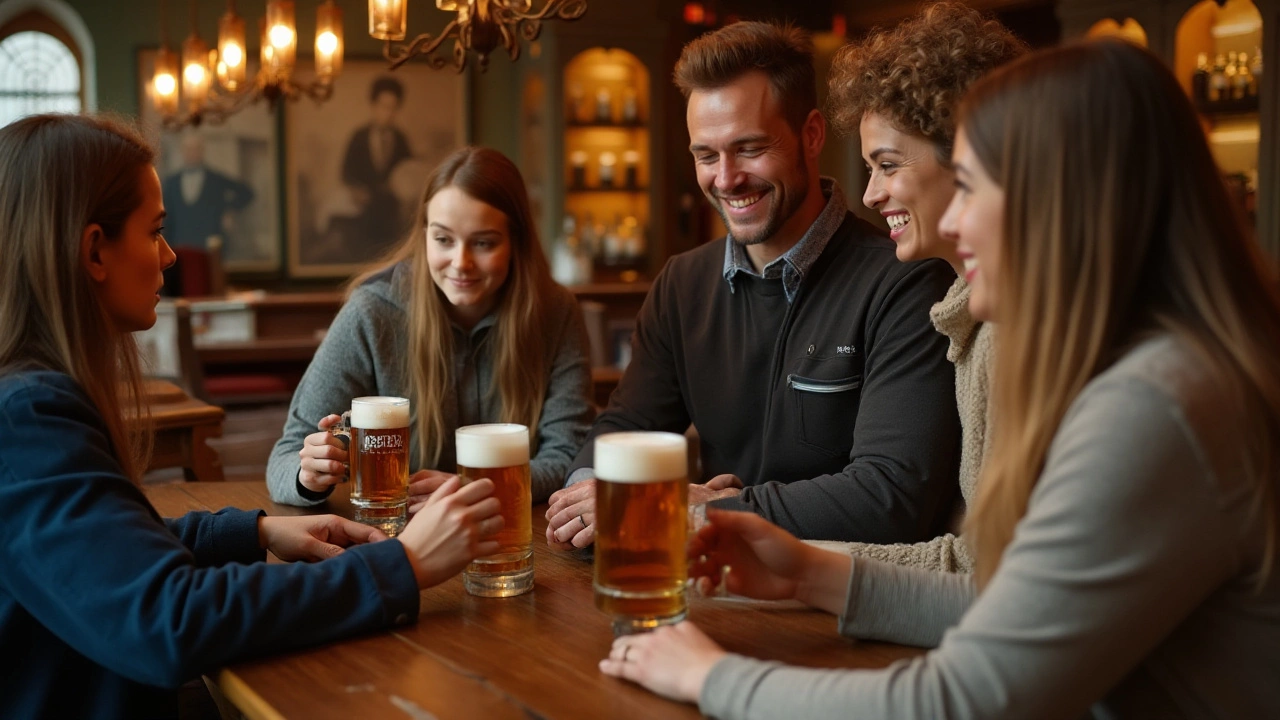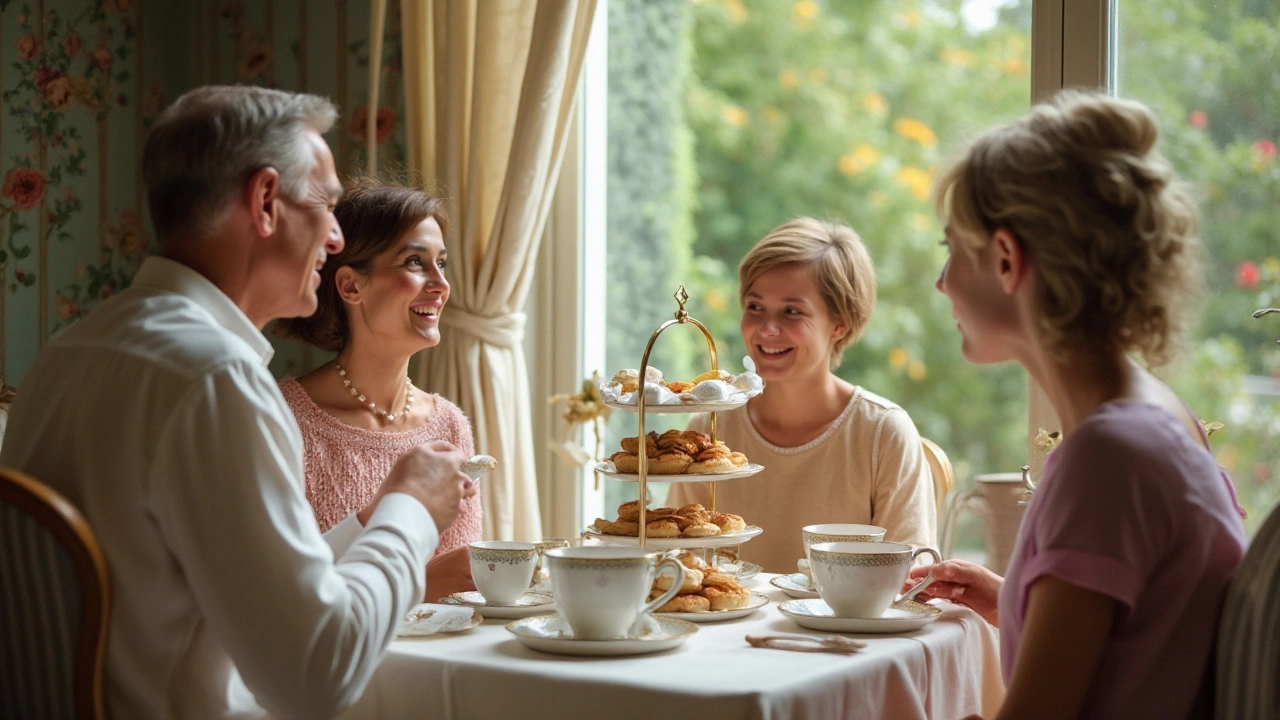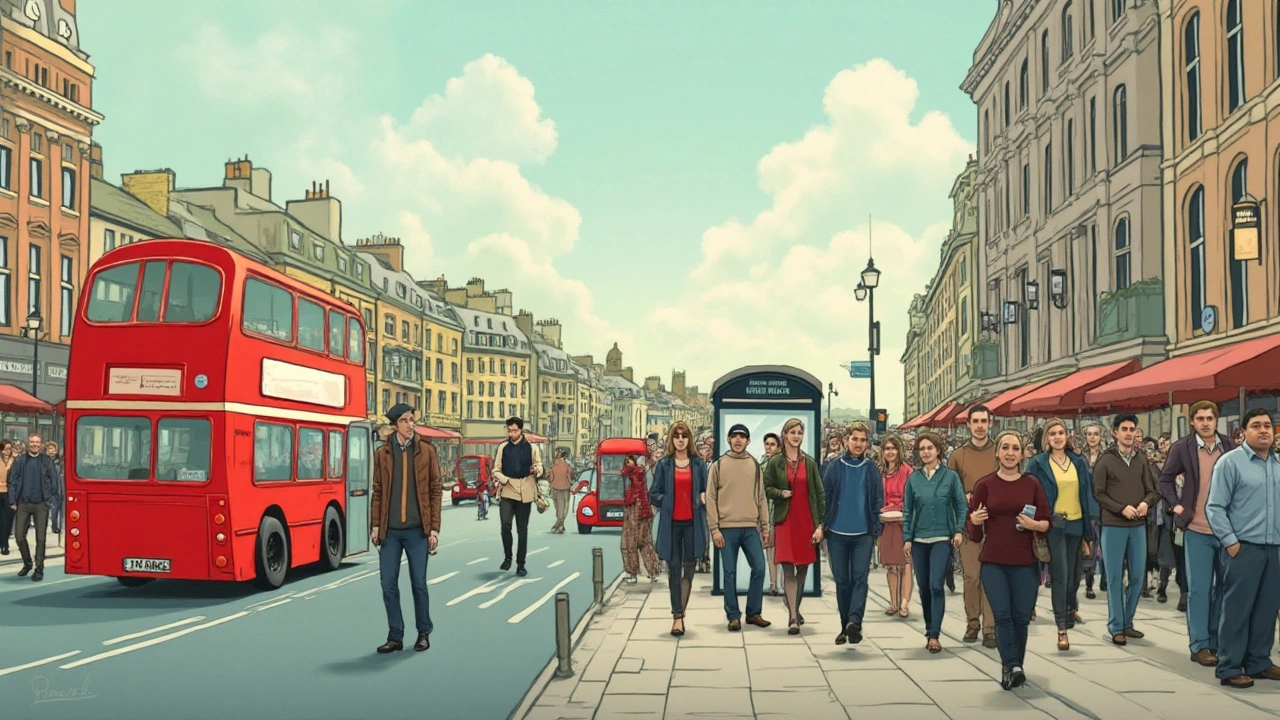When visiting the UK, understanding local etiquette can make all the difference in how you're perceived and how enjoyable your experience will be. While every culture has its quirks, the British are particularly known for their emphasis on manners and politeness. Learning a bit about what is considered bad etiquette can help you navigate social situations smoothly and leave a positive impression.
Whether you're grabbing a pint at the local pub or joining a queue, knowing what to do—and what to avoid—will ensure that you engage with locals respectfully, and perhaps even leave with new friendships. This guide aims to shed light on quintessential British behaviors, so whether you're there for a short trip or an extended stay, you'll feel right at home.
- Respecting Personal Space
- The Importance of Queuing
- Polite Conversation Starters
- Public Transportation Etiquette
- Dining Manners and Tipping
Respecting Personal Space
Understanding personal space is crucial when visiting the UK, as it plays a significant role in social interactions. The Brits are known for their reserved nature, which translates to a high regard for personal boundaries. When you're conversing or standing with others, maintaining a respectful distance is key. For instance, standing too close during a conversation may feel intrusive to many locals. A general rule of thumb is to keep at least an arm's length distance, which allows both parties to feel comfortable and not crowded.
The concept of personal space varies from culture to culture, but in the UK, it's linked to the high value placed on privacy and personal freedom. This respect extends not just physically but also conversationally. Asking overly personal questions on meeting someone can be seen as rude. Topics like religion, income, and political views are generally avoided unless you are well-acquainted with the person. Instead, safe conversation starters might include the weather, which is ever-changing and always topical in the UK. A recent survey even found that 94% of Brits admit to talking about the weather at least once in the past six hours.
When using public spaces, it’s essential to be aware of your surroundings and the space you're occupying. Public transportation, for example, is an area where respecting personal space becomes even more important. Seats on buses and trains often fill up quickly, so occupying just one seat without spreading your belongings is considered thoughtful. In crowded places, attempting not to make physical contact with others is appreciated. As etiquette expert William Hanson once said,
"Boundaries may be invisible, but they are certainly felt and respected in British society."Such respect for space and boundaries reflects the broader British culture of politeness and consideration.
From parks to high streets, this awareness of personal space contributes to the social fabric. Knowing when to step aside or offer a small smile can make interactions smoother and more pleasant. It’s often the little things, like lowering your voice during a phone call or avoiding cutting queues, that signal respect for the shared environment. Given the diversity of people living and traveling in the UK, maintaining these boundaries helps create a harmonious atmosphere where everyone can enjoy. This consideration doesn’t only apply to formal settings; respecting personal space is equally important in more relaxed environments, ensuring everyone feels at ease.
The Importance of Queuing
In the UK, the concept of queuing is not merely a social norm but an institution, cherished and respected by locals. Queuing embodies the British virtues of patience, orderliness, and fairness, and understanding this tradition is fundamental for anyone navigating public spaces in the UK. Whether you are at a bus stop, a supermarket, or waiting for a turn at the museum, joining the back of the queue without any attempt to jump or disrupt is expected and respected. Failing to adhere to the queuing etiquette can result in raised eyebrows and polite, yet firm, reminders from locals who hold this practice dear. The art of queuing is so ingrained in British culture that, to locals, it stands for much more than lining up; it’s a commitment to maintaining order in public life.
The historical roots of queuing can be traced back to World War II when rationing made queues a part of everyday life. This necessity translated into a shared understanding and practice that continues to define British culture today. According to a study by The Telegraph, Brits spend over 36 hours a year waiting in queues, a testament to their patience and dedication to upholding this tradition. For travelers, witnessing a well-formed queue can be an insight into the collective consciousness of a nation that prides itself on civility and respect for others. Joining a queue is, in essence, a silent agreement to participate in this social contract and a way to engage with British society in an authentic manner.
Visitors should know that queuing is taken seriously across different settings. When in doubt, always look for the end of a line and take your place without hesitation. Pushiness and attempts to cut in line are generally frowned upon, and such actions can quickly tarnish your reputation among locals. Most people appreciate it if you politely ask “Is this the end of the queue?” when you’re unsure where to join. This small act of consideration demonstrates respect for the queuing etiquette and will be well-received. Entertainingly enough, during peak times or events, Brits are known for forming what’s colloquially referred to as a ‘double queue’ by necessity, showcasing their adaptability while still adhering to the underlying queue principle.
As George Mikes, an author well-versed in British culture, remarked, "An Englishman, even if he is alone, forms an orderly queue of one." This quip perfectly encapsulates the uniqueness of a practice that can sometimes seem amusingly rigid, but to the British, it’s a part of their social identity.
UK travel etiquette ensures that visitors recognize queuing as a valuable practice worthy of respect and participation. The efforts everyone makes to adhere to this custom contribute to smoother operations and interactions in bustling urban environments. Understanding this unwritten rule not only helps you blend in with locals but also allows you to experience the warmth and camaraderie that a shared line can foster. Engaging with Brits over a shared waiting experience is often a delightful surprise for travelers keen on understanding the quintessential aspects of British customs.

Polite Conversation Starters
In the UK, engaging in polite conversation is considered a key part of social etiquette and is highly valued across various settings, from casual social gatherings to more formal events. Starting a conversation with a stranger or even an acquaintance can sometimes feel daunting, but British culture has cultivated an array of subtle yet effective conversation starters that help bridge social gaps. One of the most commonly known and delightful ways to break the ice is to comment on the weather. The UK is famous for its unpredictable weather, which gives it an ideal status as a conversation opener. Remarks about the rain, sunshine, or even the odd snow flurry are universally understood and rarely fail to elicit a smile or a shared nod of agreement from locals.
Another popular strategy is asking about one’s journey or trip, especially when meeting new people at conferences or events. It’s a considerate way to engage, as travel is often a shared experience that everyone can relate to in some measure. This method not only shows interest in someone’s background but also opens up a path for sharing related stories or insights. In social situations like parties, a compliment can also serve as an icebreaker. Compliments on attire or an accessory, phrased sincerely, often lead to more extended conversations. The British, while reserved in some ways, appreciate genuine kindness and often respond warmly to such gestures.
The ability to discuss current events or sports is another handy tool in crafting meaningful interactions. The British are passionate about sports, particularly football, cricket, and rugby, and bringing up a recent match can catalyze lively discussions. According to a survey by Sport England, football remains the most popular sport, with millions regularly watching or participating, making it a common ground for many. While discussing such topics, it's vital to remain neutral and steer clear from divisive debates, especially if you are not well-acquainted with your conversation partner. In work or urban settings, asking for local restaurant recommendations or nearby attractions can be an effective topic, displaying both curiosity and willingness to engage with local culture.
"The magic in all genuine conversations is to approach others with kindness and a sense of genuine interest," writes Debrett's, a revered authority on British etiquette and manners. This perspective echoes throughout UK social landscapes, where interest in another’s preferences or experiences often begets meaningful exchanges.
Being well-versed in polite conversation starters is an invaluable social skill, especially while traveling. Though seemingly minor, these soft skills reflect one's respect for cultural nuances and personal engagement. Engaging in dialogue intentionally bolstered by simple but effective starters also enriches interactions and personal connections, offering a more fulfilling experience in the UK. Locals often appreciate a sense of humor, so sprinkling light-heartedness into these discussions is encouraged, provided it respects the British preference for subtlety.
Public Transportation Etiquette
Using public transportation in the UK is a common and efficient way to get around, especially in bustling cities like London. However, there are unspoken rules that travelers should be aware of to avoid unintentionally offending their fellow passengers. The British greatly value their personal space, so it's crucial to respect it when using any form of public transport. Stand clear of doors to allow others to enter and exit smoothly, and always move down the aisle to make room for new passengers. In the instance of a crowded train or bus, try to remain as compact as possible without infringing on the comfort of those around you. It’s also a good idea to keep noise to a minimum; loud conversations or phone calls can quickly become a source of irritation in such confined spaces.
Another vital aspect of public transportation etiquette involves the effective use of a magical phrase that is well-appreciated throughout the UK: ‘Excuse me.’ This little phrase can help you navigate tricky situations, like when needing to pass through a crowd or accidentally brushing against someone. Also worth noting is the orderliness of British queuing customs; whether waiting for a train or a bus, lining up in an orderly fashion is expected and appreciated. The avoidance of 'queue jumping' is paramount, as breaking this unwritten rule can be met with glares or even polite reminders about one's place.
Respect for priority seating is key. These seats are designated for the elderly, disabled, or pregnant individuals, and offering your seat to someone in need is not only good manners but also a gesture that often garners appreciative nods from other passengers. In cities where the London Underground operates, you'll frequently hear reminders to ‘mind the gap’ between the train and platform, highlighting a concern for safety that should be echoed in your behavior.
"When traveling abroad, adapting to public transportation norms can seem daunting, but a little awareness goes a long way in ensuring a seamless journey and a deeper connection to the local culture."
Moreover, keeping the environment clean is highly regarded. Avoid leaving any litter or spilled drinks behind, as cleanliness is a shared responsibility. Lastly, don’t forget to validate your tickets where required; not only can failing to do so result in fines, but it's also seen as dishonest. Be prepared and ready to adapt to these unique customs when using UK travel etiquette, and you'll find public transport a convenient and enjoyable experience.

Dining Manners and Tipping
The British dining experience is a blend of tradition and modernity, embodying a unique set of customs that travelers should be aware of to navigate mealtimes with grace. From how you hold your cutlery to the subtleties of polite table talk, understanding these norms can elevate your stay in the UK. It's noteworthy that while British dining etiquette may resemble that of other Western countries, it carries its own distinct nuances that highlight the importance of respect and politeness.
For starters, when you're invited to dine at someone's home, arriving on time is key. Punctuality reflects respect for your host's schedule and effort. If attending a formal dinner, it's customary to wait until everyone is served before starting your meal. In a restaurant setting, waitstaff might not be as attentive as in other countries, as the assumption is that diners prefer privacy and space. This expectation of personal space is integral to the dining experience in the UK, where conversations with adjacent tables are rare and often considered intrusive.
As for cutlery use, the British style involves holding the fork in the left hand and the knife in the right, without switching hands as you eat. This might feel awkward if you're used to a different style, but it soon becomes second nature. The placement of cutlery when you finish your meal is also coded in etiquette; laying them parallel on your plate signals that you are done.
Now, one may wonder about the tipping culture in Britain. Contrary to practices in countries like the US, tipping in the UK is less obligatory and more a gesture of appreciation. Generally, a service charge is included in your bill, often around 10-12.5%. However, if you're particularly delighted by the service, leaving an extra cash tip is always appreciated. It's noteworthy to confirm whether the service charge has been added, as it's not uniformly applied across establishments.
“Tipping in the UK is often a reflection of the service received and while it's appreciated, it's never demanded, which can make dining experiences feel less transactional.” — Emily Dunn, etiquette expert
Interestingly, tipping is not confined to restaurants. It's customary to tip taxi drivers by rounding up the fare, and in hotels, porters may expect a pound or two for carrying your luggage. It's about acknowledging good service without feeling pressured. The balance between gratitude and not appearing ostentatious is finely tuned in British culture.
For those exploring local pubs, understanding the 'buying a round' custom can enrich your experience. This social tradition involves buying drinks not just for yourself but for others in your group, taking turns in buying rounds. It fosters camaraderie and is a great way to connect with locals. By engaging with these dining intricacies, you're not just feeding your appetite but also nourishing your understanding of British culture.





